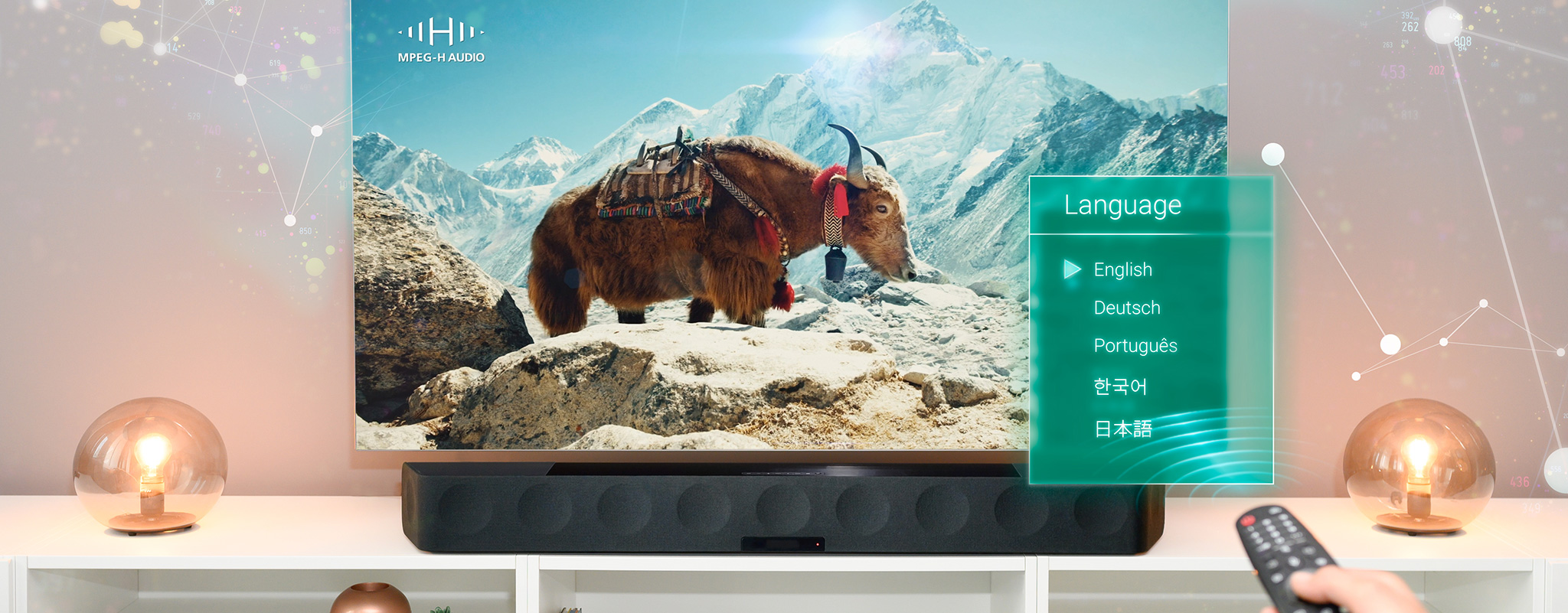Renowned licensees opt for MPEG-H, xHE-AAC, EVS and LC3/LC3plus
Building on the success of three earlier generations (mp3, AAC and HE-AAC), we are making rapid progress in the commercial deployment of our fourth-generation audio coding processes. In 2020, numerous new licensing agreements were concluded. One notable example is with semiconductor manufacturer NXP, which in March licensed a comprehensive MPEG Audio codec suite from Fraunhofer IIS that includes xHE-AAC and MPEG-H Audio. Last year also saw numerous other successes for our fourth generation of audio codecs (MPEG-H, xHE-AAC, EVS, LC3/LC3plus).
The first MPEG-H-based 360 Reality Audio music streaming services went online, offered by the likes of Sony Select, Tidal, Deezer and Amazon Music HD. This coincided with Amazon’s launch of its Echo Studio smart speaker, which incorporates Fraunhofer IIS’s MPEG-H Audio decoder software. Other new MPEG-H licensees include Sound United, which upgraded various AV receivers from its Denon and Marantz brands with MPEG-H 3D Audio in November, and McIntosh Laboratory, whose MX123 AV processor now supports the format as well. We were also pleased to announce the licensing of Fraunhofer IIS MPEG-H Audio patents to major Korean consumer electronics manufacturer Samsung. In addition, we launched the new MPEG-H 3D Audio Baseline Profile, which, as a subset of the existing profile, significantly reduces the implementation and testing effort. The latest digital audio signal processors from our long-standing customer Analog Devices already support this profile.
To provide content creators in TV and streaming even greater support with their production of MPEG-H audio content, we made two new tools available for download in 2020. The first is the ADM Info Tool, which helps create Audio Definition Model (ADM) metadata, and the other is the MPEG-H Authoring Suite (MAS). Comprising several applications, the MAS software package enables easy, fast and intuitive production of MPEG-H Audio content. We also released supplementary video tutorials on live production using MPEG-H Audio and on post-production using the MPEG-H Authoring Suite, and held several webinars attended by hundreds of TV and streaming professionals from around the world.
Meanwhile, 2020 saw many other providers begin to use the xHE-AAC audio codec for mobile streaming. Prime among the new licensees of the Fraunhofer xHE-AAC and MPEG-D DRC software implementation is Microsoft. For its part, Apple showcased the benefits of the latest generation of the AAC codec family on its devices at the 2020 Worldwide Developer Conference. Last but not least, the streaming service Netflix has been using the xHE-AAC audio codec on Android mobile devices since January 2021.
Market penetration of EVS, the 3GPP standard codec for 4G and 5G telephony, has also increased. Most recently, several mobile providers in Asia have integrated the technology into their networks. The Low Complexity Communication Codecs (LC3 and LC3plus), which now extend EVS quality to all communication platforms, have experienced a high volume of license requests since their official launch. In January, Bluetooth SIG announced LC3 as the standard audio codec for LE Audio and finally adopted the specification in September 2020. In the meantime, Microsoft, Cadence and Broadcom are among those to have become licensees of Fraunhofer’s implementation of the LC3 codec. Its sibling LC3plus, which is equipped with numerous additional features, had already been standardized in 2019 as ETSI TS 103 634 and was included in the 2019 DECT standard. In 2020, the first product for end consumers with LC3plus was launched: the W59R DECT phone from Yealink.

